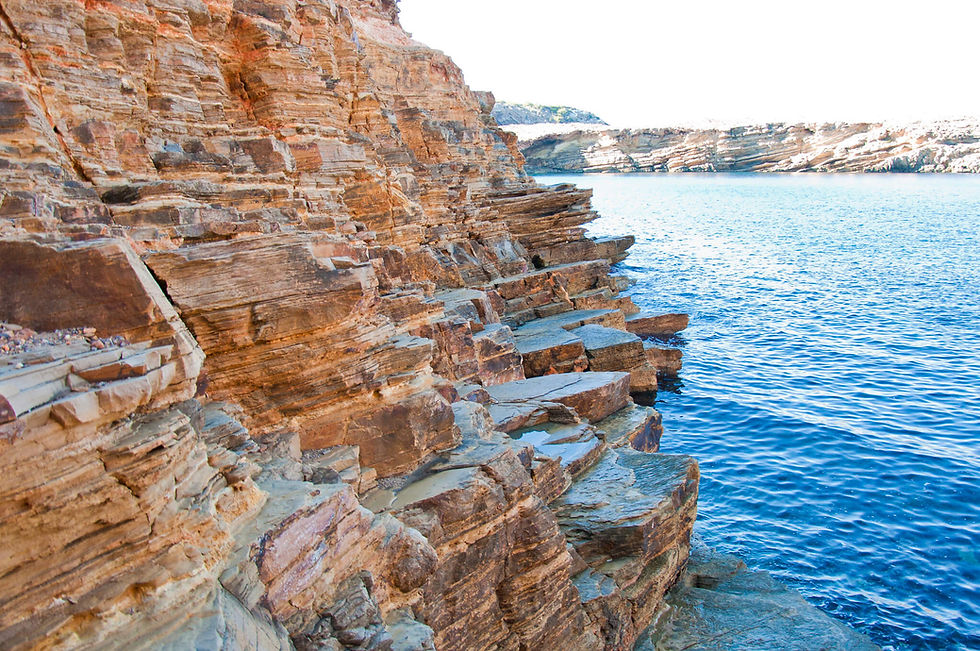The Rich History and Culture of Ibiza
- Apr 2, 2025
- 5 min read
Updated: Aug 23, 2025

Ibiza an island of a few hundred square kilometers located in the Mediterranean is recognized for its beautiful beaches, crystal-clear water and a world-renowned nightlife. What is often forgotten is the island's rich and intriguing history that is spanning hundreds of years. Beyond the party and the heat, Ibiza offers a journey through the ages, with tales about ancient cultures, a wealth of tradition of culture, and a thriving artistic movements. If you're considering a trip to this beautiful island and want to know more about the roots of Ibiza, comprehend its past, and understand why it's much more than a vacation destination.
The Birth of Ibiza
Let's step back in time, to more than 2500 years back. Ibiza's story began with the Phoenicians, who were among the earliest people who travelled by sea. The Phoenicians who first inhabited Ibiza around 654 BC established the name "Ibosim" following the god Bes who was the god of dance, music, and arts. This was the beginning of the role Ibiza played as a major hub for culture and commerce within the Mediterranean. The island was strategically located within Europe and Africa and was the ideal destination for traders and tourists alike.
The Phoenicians left behind a wealth of evidence of their presence on the island, and their legacy can be felt in Ibiza in the present. They were the first to establish Ibiza's important settlement that would later grow into Ibiza, a bustling town. Ibiza (or Eivissa, as it's referred to by Catalan). Through the centuries, Ibiza came under the administration from The Carthaginians, Romans, Byzantines and Moors each of whom left the traces of their history, which contributes to the island's distinctive character.
The Romans and the Island's Strategic Importance
The second century BC, Ibiza became a important location for the Romans who were impressed by its natural resources and its strategic location for trade. Ibiza or "Ebusus" according to how it was then known was a major element within the Roman Empire. The Romans left a lot of marks across the islands, which included remnants of Villas and temples and roads.
In this period, Ibiza's position as a centre for trade and agriculture increased. It was during this time that the Romans introduced new methods and crops to Ibiza, which created the landscape of Ibiza in the way we see it in the present. The old Roman ruins scattered across the island, like the magnificent site of Sa Caleta, are a evidence of this time and offer visitors an insight into Ibiza's flourishing Roman time.
A Medieval Past and Moorish Influence
After the fall of Roman Empire, Ibiza experienced an array of attacks particularly by the Moors during the eighth century. The Moors brought their unique architectural style along with cultural influences, as well as customs that have left an influence on Ibiza.
It was during this time that the old town of Ibiza, Dalt Vila, began to form. Dalt Vila, which means "Upper Town" in Catalan it is today an UNESCO World Heritage site and one of the most stunning and well-preserved medieval cities in Europe. The Moors protected the town with huge walls and constructed impressive structures to guard the town from invasion. The walls are still in place and offer some of the most beautiful perspectives of Dalt Vila. Walking across Dalt Vila is like taking an excursion back to the past and its cobbled streets, ancient structures tell stories of a long history.
Ibiza's Cultural Heritage: A Blend of Traditions
While the history of Ibiza is shaped by different cultures and invasions Ibiza's identity as a cultural island has been formed by its distinctive mix of traditional. Ibiza's rich cultural heritage is grounded in the local culture as well as language and arts that have been handed over generations.
The most striking aspects of the Ibiza culture is its whitewashed traditional houses. These homes, referred to as "casas payesas" are scattered throughout the countryside, as well as in smaller villages. They are constructed using local materials such as clay and stone the houses are designed to be cool in the summer seasons. The simple, yet elegant design is a reflection of the island's authentic and rustic way of life.
Alongside architecture, music is an important part in the Ibiza's identity as a cultural entity. Ibiza is famous for its folk songs that includes the "ball pages" the traditional dance that is that is performed at celebrations. The music is accompanied by"ximbomba, "ximbomba" (a kind of drum) and "flabiol" (a flute) This music draws the people of Ibiza together during celebrations. Folk music and dance in Ibiza are a vital element of the island's culture calendar, with a variety of celebrations devoted to the display of the ancient customs.
Festivals and Celebrations: Keeping Tradition Alive
Ibiza's festival is one of the best ways to be a part of the island's lively cultural scene. They are full of music, dancing foods, as well as a profound feeling of belonging. One of the most significant events is the "Fiesta de la Tierra" which is celebrated each year in April to honor the patron saint of the island, Santa Maria de las Nieves. In this festival, the people gather on the streets for a number of parades, performances and celebrations. This is a chance for the entire community to come together and celebrate their unique tradition.
Other events, such as "Es Firo,"" an event to celebrate Ibiza's historical victory over pirates, include processes and reenactments which allow guests to be connected to the island's history in a sociable and enjoyable manner. These festivals not only highlight Ibiza's heritage but also show the pride that the people of Ibiza have in their history and culture.
A Spiritual Island: From Ancient to Modern Day
Ibiza is also famous for its spiritual aspects. The hippies during the 60s and 1970s came in Ibiza seeking peace and liberation and left an indelible tradition of religious belief. Many of them flocked to the island's Ibizan religious institutions as well as nature reserves and others followed the holistic lifestyle which continues to flourish today.

The island also hosts numerous intriguing traditions--like that of Ibizan Easter which includes procession and distinctive religious practices. Also, don't forget that the the lunar calendar which has for centuries been a part of the island's rhythms. people believe that the full moon boosts the island's mystical energy
Artistic Influence: A Haven for Creatives
Ibiza's beautiful landscapes, serene ambience, and warm weather have always drawn creatives and artists from all over the globe. From sculptors to painters as well as writers to musicians The island has inspired thousands of people to express their creativity and ideas.
The Ibiza's rich artistic heritage is active today, with a vibrant art scene, which includes galleries exhibits, shows, and creative workshops. Indeed, many modern artists are still finding the inspiration for their work in the beauty of Ibiza's surroundings and diversity, from rocky cliffs to tranquil beaches. Ibiza's art scene is a testimony to the constant creative spirit that has resulted in Ibiza an international destination for culture for a long time.
Preserving Ibiza's Heritage for Future Generations
Although Ibiza is embracing modernity, it also has an unwavering commitment to the preservation of its historical and cultural heritage. In 1999, Ibiza was included on UNESCO's World Heritage list, recognized as having "Biodiversity and culture." This listing is a testament to the importance of preserving Ibiza's unique culture and natural environment for the future generations to take pleasure in.
The efforts to protect Ibiza's rich heritage continue as local groups as well as government agencies trying to preserve Ibiza's historic places, customs along with its stunning natural surroundings. No matter what the ruins from the past or the traditional celebrations, the preservation of Ibiza's rich cultural heritage will ensure that the island's rich history will continue to attract travelers from all over the globe.
What’s Your Main Reason for Visiting Ibiza? Let us know!!
Party / Nightlife / Festival / Events
Yoga / Wellness Retreats / Nature / Outdoor Activities
Beautiful Beaches / Relaxation / Bohemia vibes
Family Holidays
You can vote for more than one answer.



